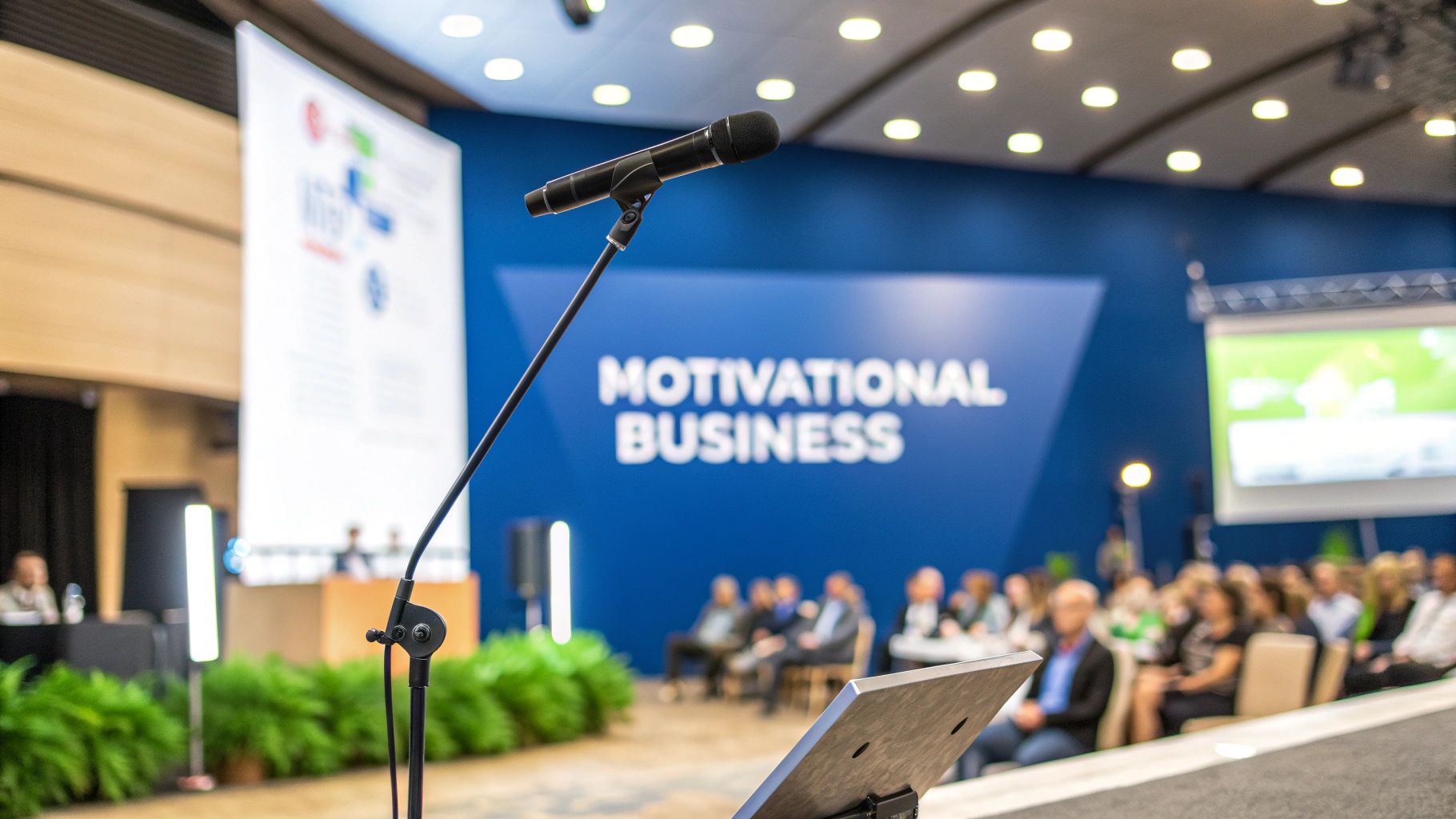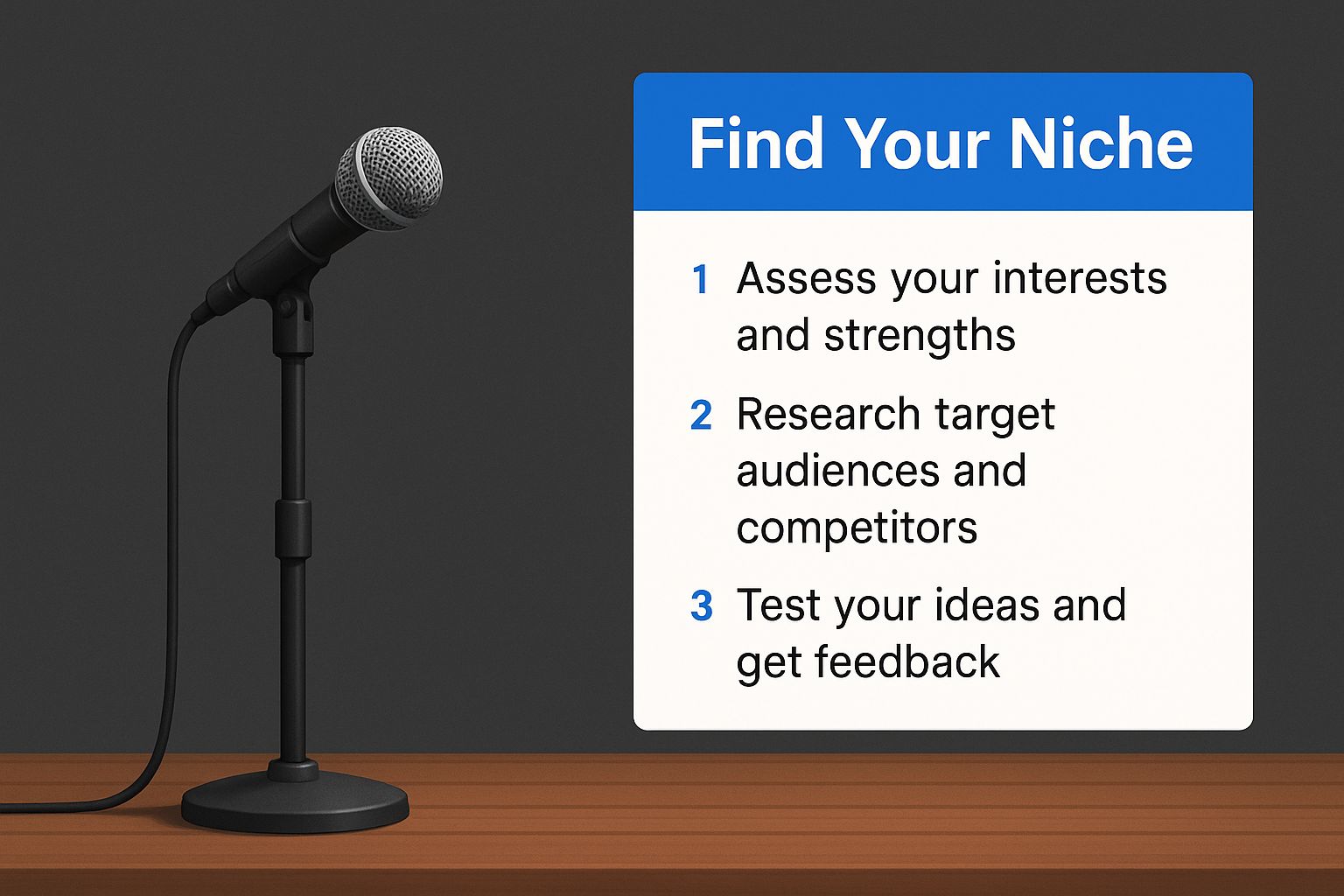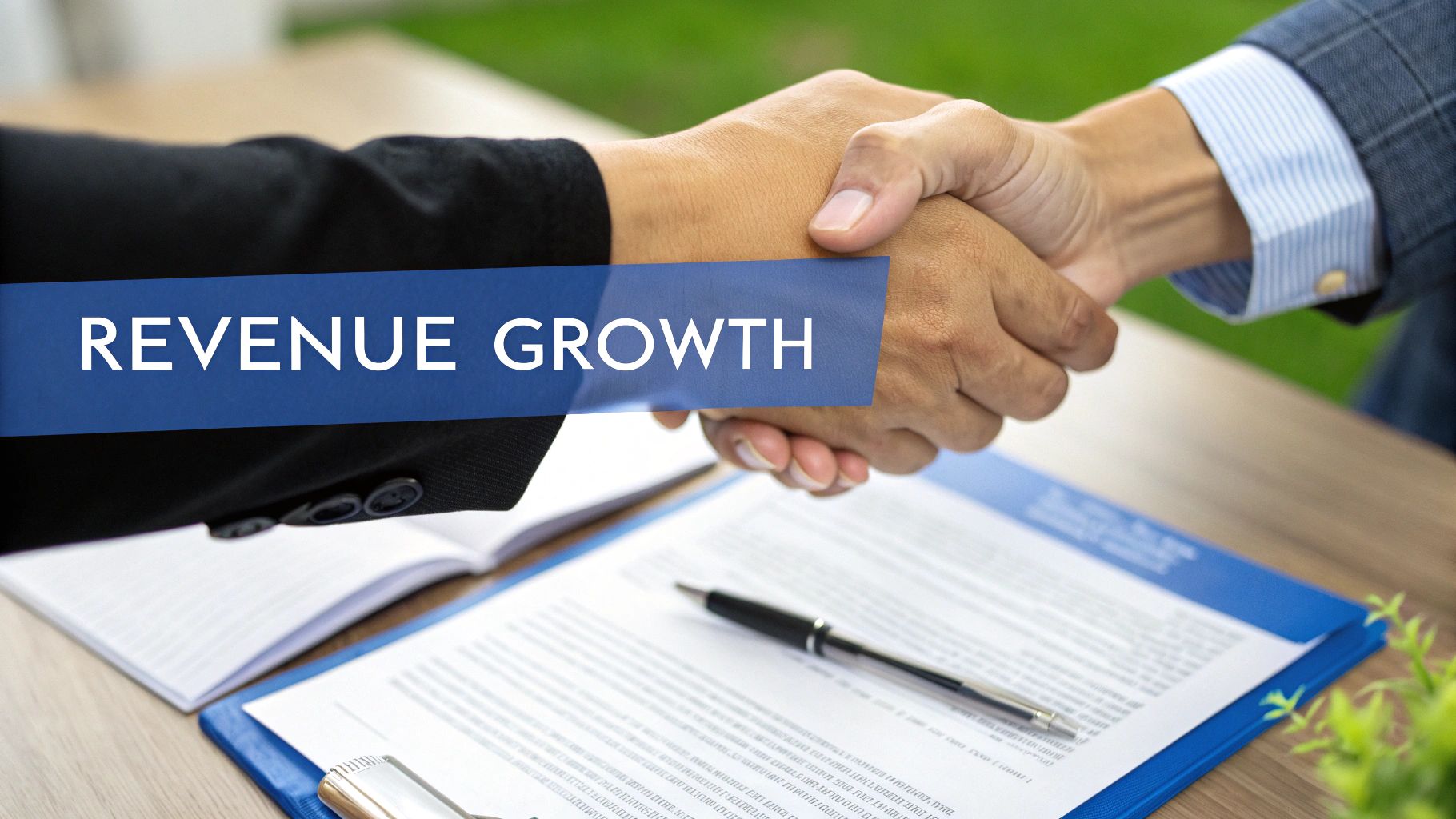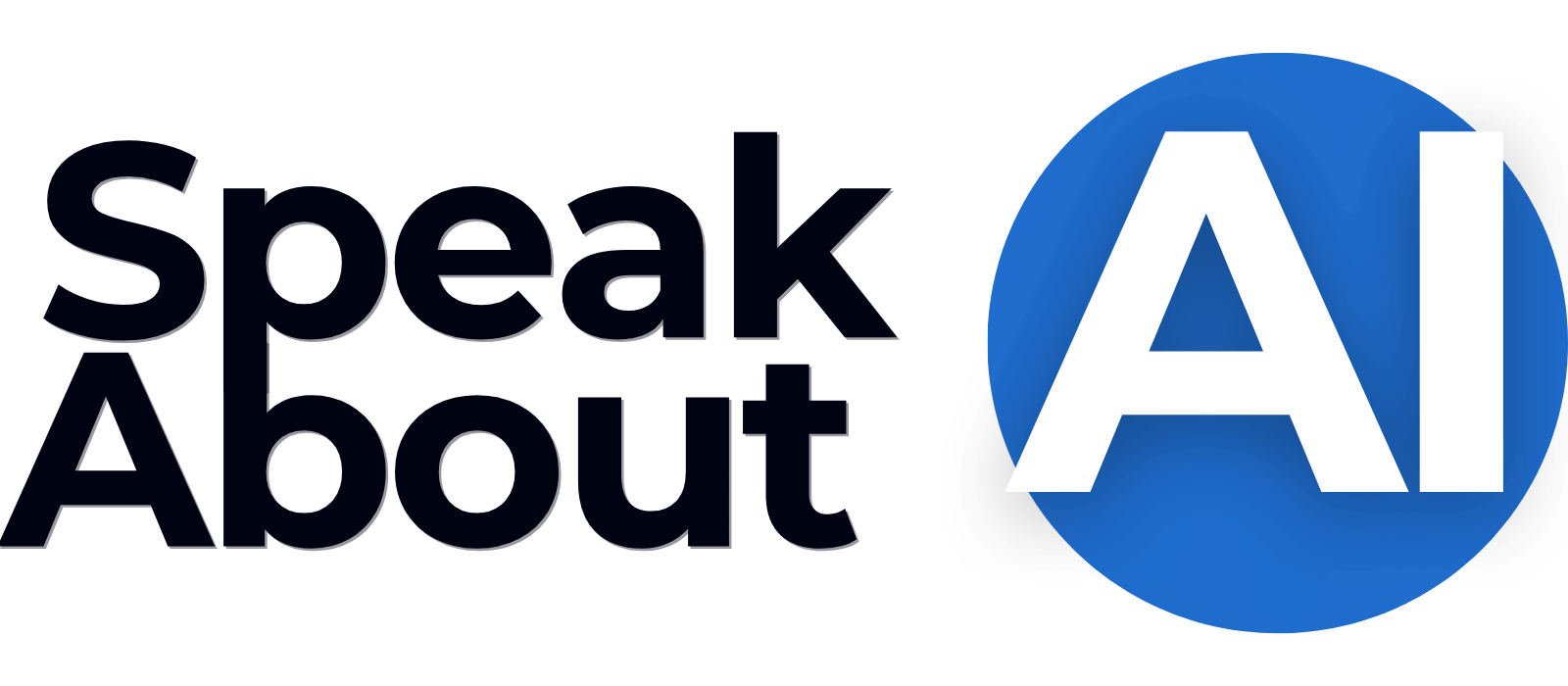Start Your Motivational Speaking Business

A great motivational speaking business isn’t built on a stage—it’s built on a single, powerful message that solves a real problem for a specific group of people. This is where the work begins. Getting this part right is what turns a passion for speaking into a bookable, profitable career.
Crafting Your Core Message and Niche
Before you can inspire an audience, you have to know exactly what you stand for and who you are uniquely equipped to help. This isn't about coming up with generic platitudes; it’s about digging deep to find the precise value only you can offer.
The magic happens when your personal story, professional expertise, and genuine passions intersect with a tangible need in the market. For instance, a speaker on our roster, a former tech executive, doesn't just talk about "leadership." She helps new female managers in STEM fields conquer imposter syndrome. Another speaker transformed his recovery from a major athletic injury into a powerhouse message on resilience for corporate sales teams navigating volatile markets.
Identify a Profitable Niche
Your niche is where your expertise meets real market demand. When you define it clearly, event planners don't just see a speaker; they see the perfect solution to their problem.
Here are a few areas where speakers on our roster have found incredible success:
- Corporate Wellness: Tackling burnout and boosting mental well-being in high-stress jobs.
- Tech Leadership: Helping executives navigate digital disruption and build cultures of innovation.
- Youth Empowerment: Giving students the tools to build resilience and step into leadership roles.
- Sales Motivation: Arming sales teams with the mindset to crush targets and bounce back from rejection.
This kind of focus is what separates the pros from the hobbyists. And make no mistake, this is a serious business. The motivational speaking industry is valued at roughly $1.9 billion in the U.S. alone, which shows a massive demand for speakers who deliver targeted, impactful messages. You can dig deeper into the speaking industry market stats on MarketResearch.com.
Your signature story is your most powerful marketing tool. It’s not just what you say, but why you are the only one who can say it. It should be authentic, emotional, and directly tied to the lesson you want your audience to learn.
Develop Your Signature Story
Your life experiences are the raw material for your most powerful talks. A signature story is a carefully crafted narrative—a pivotal moment, a huge challenge overcome, a hard-won lesson—that brings your core message to life. How can that one story serve an entire audience?
This narrative becomes the heart of your keynote, your marketing, and your entire brand. It’s the human element that forges a genuine connection and makes your message stick, turning a good speech into an experience that truly moves people to act. For a more detailed breakdown, check out our guide on how to become a keynote speaker.
Building a Brand That Books Gigs
Think of your brand as your silent salesperson. It’s the collection of assets working 24/7 to convince event planners that you’re not just a speaker, but the perfect solution to their audience’s problems. Getting this right isn't just a "nice-to-have"—it's a non-negotiable step if you want to get booked consistently.
It all boils down to having a polished set of tools that instantly communicate authority. This isn't about vanity; it's about making it incredibly easy for a busy decision-maker to say "yes." For example, one of the AI ethics experts on our roster has a website that immediately showcases her appearances on major news networks. That simple visual cue builds instant credibility before a planner even reads a single word of her bio.
Develop Your Essential Assets
Every speaker who gets paid well has a core set of marketing materials. These are the building blocks of your brand and the first impression you'll make. Don't skimp here.
- A Professional Website: This is your digital home base. It must feature your bio, speaking topics, video clips, and glowing testimonials.
- High-Quality Headshots: Invest in a real photographer. Get shots that reflect your unique speaking style—whether that's approachable and warm, sharp and authoritative, or dynamic and energetic.
- A Compelling Speaker Reel: A short, punchy video (2-5 minutes) is often the single most important asset for getting booked. It needs to showcase your best moments on stage.
Another speaker we represent, a specialist in machine learning for healthcare, has a killer reel. It masterfully intersperses clips of him commanding the stage with powerful soundbites from event organizers praising the results. That combination is pure gold—it proves he can own a room and deliver tangible value.
To help you get started, here's a checklist of the essential branding assets every professional speaker needs to have in their toolkit. These are the materials that will do the heavy lifting for you, making it clear to event organizers that you're a pro.
Essential Branding Assets for a Motivational Speaking Business
| Asset | Purpose | Key Elements |
|---|---|---|
| Professional Website | Your central online hub for all information. | Bio, speaking topics, video reel, testimonials, blog, contact form. |
| Speaker One-Sheet | A single-page PDF "brochure" for event planners. | Headshot, bio, talk titles & descriptions, testimonials, contact info. |
| High-Quality Headshots | Creates a professional first impression across all platforms. | A mix of styles (e.g., smiling, serious, action shot) in high resolution. |
| Speaker Reel | The most critical sales tool; shows you in action. | 2-5 minutes of your best stage moments, audience reactions, and testimonials. |
| Client Testimonials | Provides social proof and builds trust. | Quotes or short video clips from past clients (with their permission!). |
| Professional Bio | Tells your story and establishes your expertise. | Short, medium, and long versions for different uses (introductions, programs). |
Having these assets ready to go signals that you're serious about your business and makes the booking process seamless for clients.
A great speaker one-sheet isn’t a resume; it’s an advertisement. It should quickly answer an event planner's three main questions: What problem do you solve? Who do you solve it for? And what transformation can my audience expect?
Crafting a Narrative That Sells
Your bio and one-sheet are sales tools, plain and simple. They shouldn't just be a laundry list of your accomplishments. They need to tell a story that connects directly with an event organizer's goals. Always frame your experience in terms of the results you create for audiences.
Instead of saying, "Authored five books," try something like, "Author of five books that have helped over 100,000 professionals master AI-driven productivity." See the difference? One is a fact; the other is a result.
The infographic below really drives home how finding your niche—which we covered earlier—informs every single one of these branding decisions.

As the visual shows, a powerful brand is built on a laser-focused message. This ensures all your assets are speaking the same language to a specific audience. Every element, from the style of your headshot to the copy on your website, must be perfectly aligned with the niche you intend to dominate.
Marketing Yourself and Securing Gigs
Having a killer message is one thing, but it's useless if no one hears it. To actually build a business as a speaker, you need a marketing plan that's just as sharp as your signature story. This isn't about just making noise online; it’s about getting in front of the exact decision-makers who need to hear what you have to say.
Think of it this way: your marketing should demonstrate your value long before you get near a stage. One of the most-booked speakers on our roster, an expert in corporate resilience, consistently posts insightful videos on LinkedIn about how teams can navigate uncertainty. He’s not selling—he’s teaching.
The result? Event planners don't just stumble upon him. They actively seek him out because he's already proven he's the expert they need.
Content That Builds Authority
Content marketing is the engine that builds your credibility. When you create and share genuinely useful insights, you're not just marketing—you're proving your expertise and attracting people who are already looking for a solution. The goal is to become the go-to resource in your specific niche.
You don't need to do everything at once. Start here:
- Solve Problems with Blog Posts: Write articles that tackle a real-world problem for your target audience. If you speak on sales motivation, a title like "3 Mindset Shifts to Crush a Q4 Sales Slump" will get way more traction than a generic post about staying positive.
- Show, Don't Just Tell, with Video: Short-form video on LinkedIn or Instagram is perfect for this. Share one powerful takeaway from your keynote, answer a common question from your last Q&A, or offer a quick, actionable tip. This gives planners a taste of your energy and style.
- Fish Where the Fish Are: Don't spread yourself thin across every social media platform. If your clients are corporate, LinkedIn is your home base. If you're focused on youth empowerment, Instagram or TikTok makes more sense. Be present where your ideal clients spend their time.
A smart content strategy works like a magnet. It pulls in event organizers who are already searching for someone with your specific skills. For a deeper dive, our guide on building a corporate event marketing plan has more on this.
The Unbeatable Power of Referrals and Networking
While a solid digital presence is non-negotiable, this industry still runs on relationships. Building real connections with event planners, bureau agents, and even other speakers is a long-term play that pays off big time.
The numbers back this up. Today, 65% of speakers say referrals are their primary source for new bookings, a huge jump from just 52% a few years ago. This trend highlights a simple truth: a phenomenal performance is your single best marketing asset. You can read more about these shifts on GreatMarketingWorks.co.uk.
After every single speech, your main marketing goal should be to deliver so much value that the event planner turns into your number one fan. The best gigs almost always come from someone in the audience who was blown away by your message.
You have to be proactive to turn one gig into many. Always follow up with the event planner to say thank you, ask for a testimonial, and gently ask if they know of other departments or partner companies that could benefit from your talk. It's a simple loop that creates a powerful referral system to keep your calendar full.
Pricing Your Services and Structuring Offers
Let's talk about the part that makes most new speakers sweat: setting your fees. It's tempting to lowball your price just to get a "yes," but that's a fast track to burnout. Pricing with confidence is what turns this passion into a sustainable business.
Remember, your fee isn't just a number you pull out of thin air. It’s a direct reflection of the transformation you deliver. It’s the value you bring to that room, long after you’ve stepped off the stage.
Of course, your pricing will evolve. When you're just starting, you might set a lower fee to get those crucial first bookings and collect testimonials. But the goal is to quickly pivot to a model that respects your expertise. A speaker we represent, for instance, specializes in AI adoption for manufacturing teams. She commands a premium because her insights directly boost a company's efficiency and profitability. That's tangible value.

Calculating Your Value Based on ROI
Here’s the single most important mindset shift you need to make: stop asking, "What is my time worth?" and start asking, "What is the outcome worth to my client?" This is the core of value-based pricing.
A single, powerful speech can ignite massive returns for a company—we're talking increased sales, better employee retention, or a huge jump in team productivity.
So, how do you put a number on that? Consider these factors:
- Audience Size: A keynote for 5,000 people delivers exponentially more impact than one for 50.
- Client’s Problem: How big is the pain point you’re solving? Firing up a sales team right before their biggest quarter has a clear, measurable financial upside.
- Your Expertise: If you have specialized knowledge in a high-demand niche, you can and should charge a premium.
Even the absolute top-tier speakers pulling in $50,000 or more for a single talk justify their fees this way. They frame the conversation around the immense return on investment they provide the organization. This isn't just a negotiation tactic; it’s the truth.
Structuring Tiered Offers
A flat fee for a 60-minute keynote is just your starting point. The real pros build scalable offers that meet clients at different budget levels and maximize the revenue from every single engagement. This isn't about being greedy; it's about creating deeper, more meaningful partnerships.
Your goal should be to turn a one-time speech into a long-term relationship. Offering packages that extend your impact beyond the stage makes you an invaluable partner, not just a one-off speaker.
A tiered structure is the perfect way to present your services. It gives clients options and cleverly positions your preferred package as the best overall value.
Here's a simple, effective model to start with:
- Tier 1: The Keynote: This is your core product—the standard 45-60 minute motivational speech that gets everyone fired up.
- Tier 2: The Workshop Package: This includes the keynote plus a 2-hour interactive workshop for a smaller group of leaders or key team members. This is where you go deeper and make the message stick.
- Tier 3: The Partnership Program: This is the premium offering. It bundles the keynote, the workshop, and adds follow-up coaching sessions or a pre-recorded video course to reinforce the learnings over the next few months.
This tiered approach builds a natural value ladder for your business. It makes it incredibly easy to upsell clients and show them the full scope of what you can do for their organization.
Delivering an Unforgettable Performance
A great speech isn't just a talk; it's an experience. Your entire business hinges on your ability to walk into a room and create a moment that inspires real, tangible action. This is where the craft of stage performance becomes your most valuable asset.
It all begins with structuring your presentation not as a list of bullet points, but as an emotional journey. Think of it like a story with a clear beginning, rising tension, a powerful climax, and a satisfying resolution. The best speakers on our roster map out the audience's emotional arc just as carefully as they do their key talking points. They know exactly when to inject humor, when to be vulnerable, and when to deliver the hard-hitting facts that drive the message home.
Commanding the Room with Presence
Your physical presence and how you manage the energy in the room are just as important as your words. Owning the stage means using deliberate movement, maintaining strong eye contact with different sections of the audience, and modulating your voice to keep people hanging on every word.
Never just "wing it." You need to rehearse until the structure is second nature. This is what frees you up to be fully present and connect with the audience on a human level.
Remember, audience energy is a two-way street. You don't just project energy out; you have to read and respond to what's coming back. If you feel engagement dipping, it might be time for an interactive element, a surprising question, or a simple shift in your tone.
A memorable performance is one where the audience feels seen and heard. It's an interactive dialogue, even when you're the only one with a microphone. Your ability to adapt your delivery in real-time is what separates a good speaker from a great one.
Handling the Q&A session is another crucial part of the performance. Don't treat it as an afterthought—it's your final act. Listen carefully to each question, repeat it so the whole room can hear, and then give a concise, valuable answer. This is your last chance to solidify your expertise and build a final layer of trust.
The Lasting Impact of Storytelling
Facts and figures inform, but stories are what make a message stick. Effective storytelling is the absolute core of a transformative speech. By weaving personal anecdotes and relatable scenarios into your presentation, you create emotional anchors that help your audience internalize your message long after they've left the event.
The power of a well-told story can have a direct impact on an organization's bottom line. For instance, we know that motivational speakers play a key role in boosting employee engagement. And when employees feel inspired, their workplace performance improves by about 20%. It’s a clear connection between motivation and productivity.
To make sure your speeches are truly impactful, you have to continuously hone your delivery. You can find excellent resources to master your presentation skills and learn how to captivate any audience.
The principles of engagement remain the same whether you're in-person or online. For a deeper dive, check out our guide on what makes for a successful online event with a virtual keynote speaker.
By focusing on these performance elements, you’ll deliver an experience that generates rave reviews and—most importantly—more bookings.
Common Questions About Starting Your Speaking Business

Jumping into any new venture kicks up a lot of dust and a ton of questions. For aspiring speakers, a few key uncertainties always seem to bubble to the surface. Let's tackle the most common ones we hear so you can move forward with confidence.
How Do I Get My First Paid Speaking Gig?
Landing that first paid engagement is all about building what I call "proof of performance." Don't be afraid to start by speaking for free or for a small fee at local spots like your chamber of commerce, rotary club, or a favorite non-profit.
The goal here isn't the paycheck; it's the assets. You want high-quality video of you on stage and powerful, heartfelt testimonials from the organizers. These become your marketing gold.
With that proof in hand, you can start networking in your chosen niche. Reach out to the people running smaller, industry-specific conferences. Think of those first few paid gigs as an investment in your motivational speaking business. The value you deliver is the leverage you'll use to book bigger stages for higher fees.
Do I Need a Certification to Be a Speaker?
Let's clear this up right now: no. A formal certification is absolutely not required to become a successful motivational speaker. Your real credibility comes from your unique expertise, your story, and your proven ability to deliver real takeaways for an audience.
Event planners aren't looking for a piece of paper. They're looking for someone who can solve a problem for their attendees. Period. Your focus should be on honing your craft, practicing your talk, and getting feedback.
Your powerful message, combined with glowing testimonials from past clients, will always be your most effective qualifications. Let your results speak for themselves.
Sure, joining a group like Toastmasters is a fantastic way to build confidence and practice your delivery in a safe space. But at the end of the day, your performance is the only credential that truly matters.
What Legal Steps Are Necessary to Start?
To operate like a pro and protect your personal assets, you absolutely need to set up a legal business entity. An LLC or a sole proprietorship is a common starting point, but the key is creating that separation.
Next, you need a rock-solid speaking agreement drafted by a lawyer. Don't skip this. This contract should clearly lay out:
- Your speaking fees and when you get paid
- Who covers travel and accommodation
- Crystal-clear cancellation policies (for both of you)
- Rules around recording your talk and who owns the intellectual property
This document protects both you and the client by setting clear expectations from the start. We also strongly recommend getting business liability insurance. Investing in a quick consultation with a small business lawyer and an accountant will give your motivational speaking business the solid legal and financial footing it needs. For a more detailed breakdown of launching a service business, you might find this How to Start a Life Coaching Business Checklist really helpful.
At Speak About AI, we connect organizations with world-class experts who can illuminate the future of technology and inspire action. If you're looking to bring a leading AI voice to your next event, explore our roster of speakers and see how we can help create an unforgettable experience. Find your perfect AI speaker today.
